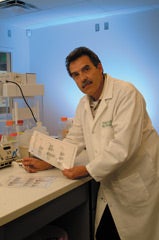
The Marshall University Forensic Science Center’s history is one rooted in innovation and education. In 1989 Huntington, the first criminal DNA analysis case was tried in West Virginia; this ground breaking case created the need for a new testing paradigm for the State’s biological evidence. By 1992, classes in forensic DNA analysis and toxicology were developed by the university and taught to the scientists at the West Virginia State Police Forensic Laboratory. The training program, and ultimately testing operations, were placed under the direction of Dr. Terry Fenger. Dr. Fenger started his career with the university 1979. During his tenure he was the Director of the Forensic Science Program and the Chair of the Department of Microbiology, Immunology and Molecular Genetics at the Joan C. Edwards School of Medicine.
To meet the growing need for forensic DNA scientists, the West Virginia Board of Trustees approved the foundation of the Marshall University Forensic Science Graduate Program in 1994; one of only seven such Master of Science degree programs in the country, at the time. The following year the WV DNA Database and Databank Act of 1995, Senate Bill 252, established the West Virginia Combined DNA Index System (CODIS) under the adminsitrative authority of the West Virginia State Police; the MUSOM’s DNA testing laboratory was designated as the convicted offender testing laboratory for the State’s CODIS samples.
In 1997 the Master of Science degree program graduated its first class of forensic science students and in 1999 the program moved into its current location featuring state-of-the-art classrooms and a fully operational forensic DNA analysis laboratory.
In 2003, the Forensic Science Center became one of three CODIS laboratories in the nation to receive ISO/IEC 17025 accreditation. The Center started doing DNA relationship testing in December of 2003. Also in 2003, the MS program saw the graduation of its 100th student and the digital evidence laboratory was created in partnership with the WVSP.
During 2004 construction of the annex’s ground floor was completed in March and the MS program was audited by the Forensic Science Education Programs Accreditation Commission (FEPAC) through the American Academy of Forensic Sciences (AAFS).
MUFSC is one of four members of the Forensic Resource Network (FRN). The FRN was created by the NIJ as a mechanism to increase the capabilities and capacities of local and state forensic laboratories. Members of the FRN are able to meet the technology and training needs of the forensic science community and create model programs that can be directly transferred to state and local crime laboratories.
In February of 2005 the MS program was awarded full FEPAC accreditation.
Clearly the Marshall University Forensic Science Center has a lengthy tradition of serving law enforcement, the university, its students, and the community as a whole. We here at the Forensic Science Center look back with great pride on this service and look hopefully towards a future full of possibilities.
